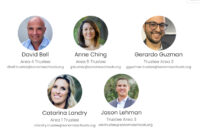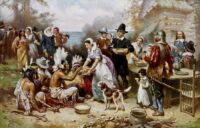America’s founders were highly literate and books held an important place in their lives. On a yearly, per capita basis, people read far more books in the 18th Century than today. This was not simply a matter of fewer distractions and forms of entertainment; enlightenment values elevated learning and education to the heights of human endeavor.
The benefits of a “classical” education included mastering numerous languages, particularly Greek and Latin. Science, mathematics, and moral philosophy were part of broad curriculum upon which matters of civic leadership were based, and the fledgling democracy of America assumed that a literate and educated public and electorate would help guide the nation into the future.
Schooling was also present in America from its earliest beginnings, and though school demands needed to be balanced against the seasonal rigors of an agrarian society, the foundations of the public education system were built early on. Colleges and universities such as Harvard were seen as the breeding ground of the future leaders of our nation, and insuring that leadership to come had acquired essential learning and critical thinking skills.
Over time, in addition to a classical education, specialization became more pronounced, and universities established departments devoted to specific subjects and conferred degrees attendant to those disciplines. Today’s colleges and universities offer degree programs in a myriad of subjects.
Somewhere along the line, however, the meaning of education changed. The search for knowledge and understanding was slowly replaced with more materialistic pursuits. The point of education became future employment rather than knowledge and developing critical thinking skills. By the end of the 20th century, education itself had largely become just another business, and conferring degrees part of an “industrialized” system of cranking out graduates.
Preparedness for employment became the goal of education, though the instability of employment in a globalized economy speaks to the inadequacy of that materialistic goal. The jobs people are preparing for with their education and degrees are likely to disappear as technology and globalism transform labor markets. In this way, overt specialization in education has done a great disservice to students and society. And in spite of specialization, many employers now recognize the value the soft skills and multi-pronged approach a liberal arts educated employee brings to the workplace.
More than ever, the world needs people who know how to think, employ creativity, have flexible minds and the urge to look below the surface of problems to see the deeper mechanisms at play. Accordingly, the industrial model of education, with its one-size-fits-all testing and grading is ill-suited to our times. Jobs and careers no longer fit into neat little boxes meant to operate for a lifetime and to meet the fast-changing needs of our fast-changing world, education needs to return to its roots, namely the pursuit of knowledge. More than ever before, we need generalists.
Cultivating curiosity, speaking multiple languages and being conversant with philosophy is an activity best begun in early education when minds are naturally curious and flexible. When such habits are cultivated in the very young, they are carried into adolescence and adulthood. Having to declare a “major” before leaving high school simply commits students to the “little box” approach to education; such 20th century thinking is no longer viable in our 21st century world.





As a former librarian-non-fiction is never checked out-biographies as well. Students are logged into the internet to download pictures and they never have to research anything-the internet does it for them. Facebook and various forms of social media is in the classrooms daily. I have witnessed this on too many occasions and nothing is monitored. I have asked students how many kids in class are using social media when they are on chrome books that are supplied by our schools, the answer was more than half. We really need to evaluate what we are really doing in the classroom! When 27 students out of 100 are proficient in math entering high school, one simply has to wonder what the heck are we doing?